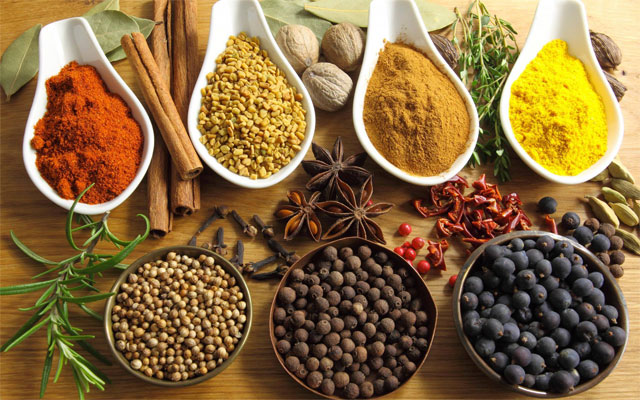
When it comes to nutrition and health, the connection is clear and fully backed up by science. Certain foods have a direct impact on our overall wellbeing, being capable of lowering our risks of developing diseases or infections.
In the last years, researchers have emphasized the importance of many superfoods that we should include in our diets and lifestyle to boost our immune systems and our resilience to diabetes, cancer, heart problems and so on.
As of late, modern medicine also takes a closer look at herbs and spices as a culinary adjuvant that can protect us from a wide variety of health issues. We are familiar with hearing about superfoods but what about super spices? Let’s take a closer look at five such herbs and spices and see what modern studies have to say about them!
1. Cinnamon
Besides adding a tantalizing flavor to sweets and drinks, cinnamon is highly appraised for its bioactive properties. The wonder behind herbs and spices is that they contain phytochemical constituents called polyphenols.
These compounds are the ones giving herbs and spice their anti-inflammatory, anti-bacterial or antioxidant properties. Cinnamon is a top list polyphenols-rich spice and in order to fully benefit from its healing powers, you should consume at least 2-4 grams a day. According to research, cinnamon has several proven healing powers:
- Increases insulin sensitivity, thus helping us burn calories and fat
- Lowers blood sugar, protecting us from diabetes
- Has a potent antioxidant capacity
- Works as a mild anti-inflammatory
- Tames stomach ulcers and nausea
2. Oregano
This is a herb that can be consumed in a fresh or dried version. Recent research showed that it is preferable to consume the dry version of culinary herbs as they release larger amounts of polyphenols while being cooked. Oregano is known since the dawn of time for its bioactive properties:
- Powerful antioxidant (thus fighting cancer): 1 tablespoon of oregano a day contains as many antioxidants as three cups of broccoli – and broccoli is one of the top super foods identified by modern medicine.
- Oregano is also associated with the treatment of respiratory problems, being a reliable expectorant, used to alleviate stuffy noses or cold-induced coughs.
3. Rosemary
Currently, under scientific scrutiny for its potential heart health properties, rosemary use has been already approved in some European countries as an adjuvant in the treatment of blood pressure problems, digestive upset, and rheumatism. Rosemary is recommended to be consumed in its dry version and a few grams a day have outstanding health benefits:
- Powerful anti-inflammatory used to alleviate headaches and migraines and also menstrual cramps or connected disorders
- It has a proven anti-allergic effect, being able to suppress allergic responses and nasal congestion
- Externally it is used to treat eczema and speed up the healing process of wounds.
4. Turmeric
Turmeric is known as a culinary spice for ages, but only in modern times has it been studied as a powerful edible ingredient in relationship with brain health and anti-cancer medicine. Turmeric is presently being studied for its potential beneficial effects on preventing the decline of brain functions associated with aging and Alzheimer’s disease:
- Turmeric is a top anticancer agent, studied for its ability to stop the growth and spread of cancer cells. Lab studies obtained some promising results of turmeric in the prevention and treatment of melanoma, colon cancer, and prostate cancer.
- Its anti-inflammatory properties have been studied in relationship with psoriasis with promising results – some studies showed it matches the effects of anti-inflammatory drugs.
5. Cayenne Pepper
One of the main and most important sources of capsaicin, cayenne is proven to reduce appetite and be an active agent in weight control and fat burning processes – as a result, it is also an active ingredient found in many weight loss supplements. According to recent studies, ingesting 1 gram of cayenne a day can help you naturally burn fat, decrease appetite and boost your metabolism.
- Recent animal studies look into cayenne’s anti-oxidant and anti-inflammatory properties, as capsaicin can further combat some forms of cancer (prostate, lung, and liver).
- It is a traditional cold folk remedy, as capsaicin shrinks blood vessels in the throat and nose, relieving congestion and other flu symptoms.
- It is used to alleviate gastrointestinal stress
- According to a study published in the American Journal of Clinical Nutrition cayenne can also be considered to have anti-diabetes benefits.
These are just the Big Five herbs and spices which received a lot of attention lately from the medical community. While further research is still needed, the daily intake of these delicious flavored wonders can keep your health in check and alleviate the symptoms of some illnesses.
Read This Next: 7 Brain Superfoods to Improve Your Memory and Concentration
Photo Credit: Shutterstock.com

Thank you Ethel. I was searching for anti inflammatory foods and came across this great artticle. I am inspired to try to fit these spices into my every day diet. I have decided for tomorrow to make a spiced omlet for breakfast by putting the savory spices in there. Then add the cinnamon to either my coffee or toast (we will see). That is just one way to get all these amazing spices in! Blessings 🙂